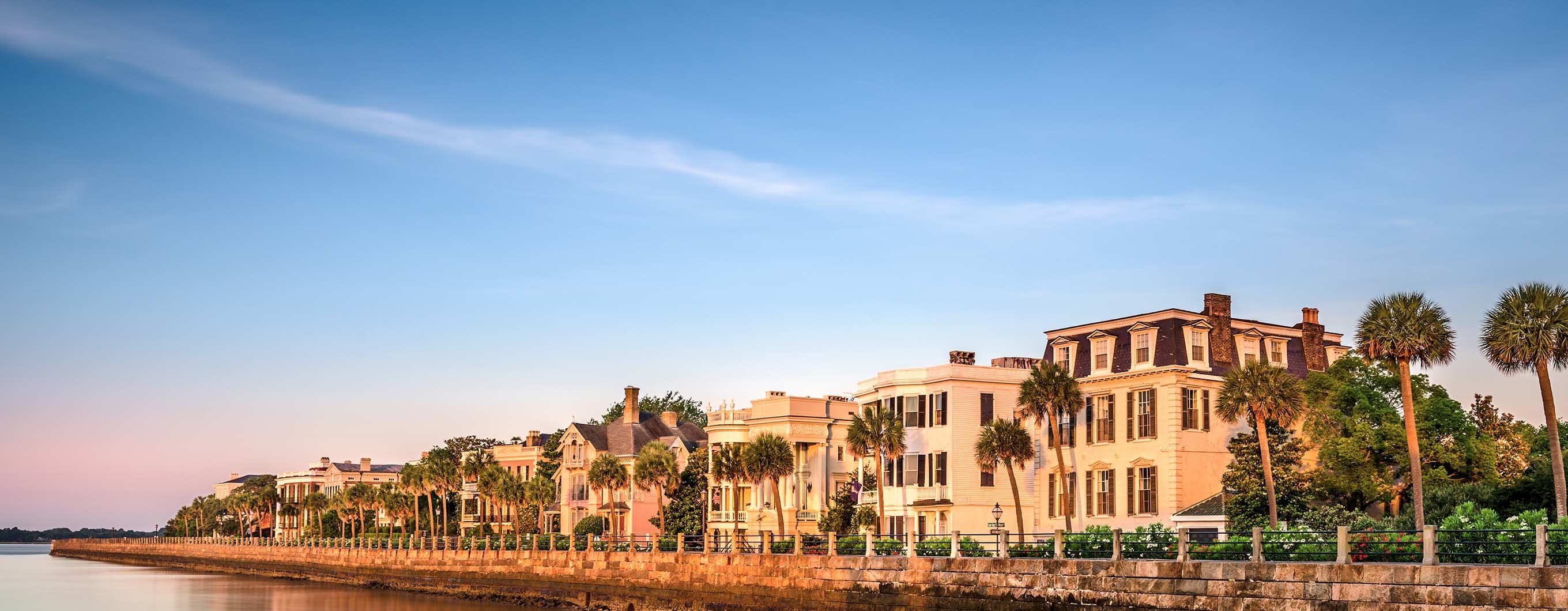
Homeowners Insurance in South Carolina
The historic and culturally rich cities of South Carolina attract tourists from all over the world. Whether it's the charming alleyways of Charleston or the lively metropolises of Greenville and Columbia, you can find a high quality of life in any SC city.
If you own a property in South Carolina, it is important to have homeowners insurance to protect your investment from disasters. This guide will give you details on the homeowners insurance in South Carolina policies that will safeguard your property and peace of mind.
What is the average homeowners insurance cost in South Carolina?
To help you understand the trends in homeowners insurance costs, here's a table showing the average insurance costs in South Carolina over the last five years.
Year | Average Annual Cost |
|---|---|
2023 | $2,728 |
2022 | $2,493 |
2021 | $2,399 |
2020 | $2,321 |
2019 | $1,463 |
What factors influence my home insurance rate?
Calculating home insurance rates involves various factors, each assessing the likelihood of a covered loss. Understanding these factors can help you effectively manage your home insurance costs. Some of them are given below:
Continuous property insurance
If you have homeowners insurance SC without filing a claim, you might save money on premiums. Insurers will see your ability to manage risks successfully and may offer you savings or incentives as a result.
Replacement cost of your home
Replacement costs play a key role in calculating premiums. Your South Carolina home insurance company will consider your house's age, structure, square footage, and features when calculating the amount required to rebuild it in its existing location. Insurance rates rise in tandem with the cost of replacement. To prevent being underinsured, make sure your coverage is equal to the replacement value of your house.
Location of your home
The location of your property heavily influences your insurance premium. In each area, insurers look at the number, kind, and expense of claims. The insurance rates for homes in locations prone to flooding or high crime tend to be more expensive. Insurance firms can also restrict or modify the kinds of coverage based on risks unique to a certain place.
Age and construction of your home
Older properties tend to have higher premiums due to the greater likelihood of issues like broken wiring or water leaks. On the other hand, insurance rates tend to be cheaper for newly built houses or those designed with fire-resistant materials. Insurance premiums and risks tend to rise in tandem with a house's age.
Proximity to fire services
You can get a lower premium if you reside within 5 miles of a fire station or 300 yards of a fire hydrant. Insurers consider the likelihood of risk of fire damage by checking whether fire services are quickly accessible.
Renovations and improvements
Due to the increased replacement cost, home insurance rates in South Carolina tend to rise after home improvements. Let your broker know about any upgrades to ensure you have enough coverage. Also, specific insurance may be required when renovating certain areas, such as installing a swimming pool or converting your basement into a livable space.
Common insurance discounts in South Carolina
Several discounts are available to homeowners in South Carolina who want to lower their insurance costs. By taking advantage of these discounts, occupants can save money on their insurance without compromising coverage.
- Multi-policy discount: You may be able to save a lot of money by getting car and house insurance from the same company. Insurance companies provide discounts to policyholders who bundle their plans into one.
- Security system discount: Installing safety equipment like smoke detectors and security systems reduces insurance premiums. South Carolina home and condo insurance providers offer discounts due to the reduced danger of theft and damage caused by these measures.
- Claims-free discount: You may be eligible for a discount if you keep your insurance record free of claims for a certain amount of time. Insurers will see this as evidence that you pose little risk to their policies.
- New home discount: Many newly constructed houses are eligible for new home discounts. Newer houses are less risky since they are built on contemporary safety standards.
- Loyalty discount: Discounts are often offered to consumers who have been loyal for a long time. Homeowners insurance in SC often provides discounts or other incentives to policyholders who remain with the company for an extended period.
- Pay-in-full discount: You may be able to save money by paying your yearly premium upfront instead of spreading it out into monthly payments. Since this lowers the insurer's administrative expenses, they will likely pass some of those savings on to you.
- Home improvement discount: You may be eligible for a discount when you replace your home's roof, plumbing, or electrical systems. This is because upgrades reduce the possibility of damage and claims.
Tips for lowering home insurance rates
Insurance prices can be adjusted to fit your budget, and there are several ways to save money without sacrificing coverage:
- Raise your deductible: You can reduce your rate by choosing a greater deductible. However, make sure you can afford to pay the deductible out of cash in case of a claim.
- Seek discounts: See if you are eligible for any discounts. Discounts are often offered to first-time homebuyers and seniors. Inquiring about discounts with your insurance company can often result in a cheaper premium.
- Bundle policies: Insurance bundles streamline insurance administration and cut prices. For example, you can bundle your house and car insurance policies with the same company and receive reductions.
- Improve your credit score: A better credit score might reduce insurance rates. Pay your bills on time, limit your credit use, and avoid new lines of credit unless absolutely necessary to raise your score. You can also improve your score by disputing inaccurate information on your report.
- Limit claims: Avoid making small claims; doing so can put you in the high-risk category. Save claims for major concerns to maintain a more affordable premium.
- Enhance home security: Installing security systems and cameras may minimize your premium. They lessen the chance of theft and damage. Having several levels of security increases protection and leads to price reductions.
- Compare prices: Compare quotes from multiple South Carolina homeowners insurance providers to find the most inexpensive and comprehensive coverage. Getting a good bargain on your insurance requirements requires some research.
What does South Carolina home insurance cover?
The right home insurance is crucial to safeguarding your property and financial well-being. Homeowners insurance in South Carolina offers comprehensive coverage options designed to protect you from various risks. Here's an overview of the key coverage options available:
- Personal liability coverage: This coverage assists with legal defense costs and damages if you are found liable in a claim. For example, if a worker is injured on your property, this coverage can help cover bodily injury damages.
- Dwelling insurance coverage: It pays for repairs or rebuilding of your home's physical structure and any directly attached structures. It covers property damage from insured events, such as hailstorms, tornados, floods, etc.
- Personal property coverage: It protects your home's furniture, clothing, and appliances. Additional coverage can be purchased for valuable items, such as jewelry or rare collectibles.
- Other structures coverage: This coverage protects structures on your property that are not attached to your home, such as garages, gazebos, or swimming pools, from perils such as fire, vandalism, and falling objects.
Additional South Carolina insurance coverage options
For added security and peace of mind, consider purchasing supplemental home insurance in South Carolina. Additional coverage possibilities to consider include:
- Loss of use insurance: If your house is destroyed or damaged in a covered loss, this insurance will assist in paying for your living costs while it is being restored. If your house becomes uninhabitable, this will guarantee that you have a place to stay and the resources to live comfortably.
- Medical payments insurance coverage: This insurance will assist with medical bills up to the policy's maximum if someone gets hurt on your property. It does not matter whether you or someone else are at fault for the harm.
- Valuable items blanket coverage: You can purchase extra security for valuable possessions like guns, jewels, or expensive crockery. With extended coverage choices, you may be able to raise the maximum theft coverage for jewelry to $10,000 per item, including compensation for lost or damaged valuables. This is in contrast to the $1,500 restriction that many insurers have.
- Homeowners equipment breakdown coverage: Important household appliances are covered in case of electrical or mechanical failure. This includes central air conditioners, lawnmowers, appliances, furnaces, etc.
What coverage is recommended in South Carolina?
In South Carolina, homeowners must consider comprehensive insurance to protect against various risks. Dwelling Coverage is important as it covers repairing or rebuilding your home's structure in case of damage. Personal Liability Coverage is also recommended to cover legal expenses and damages if anyone gets injured on your property.
South Carolina is prone to hurricanes and storms, so Wind and Hail Insurance is recommended to protect against weather-related damage. Additionally, flood insurance is crucial as standard SC homeowners insurance policies typically don't cover flood damage. South Carolina's coastal and low-lying areas are particularly vulnerable.
Personal Property Coverage protects your belongings, while Loss of Use Coverage helps with living expenses if your home becomes uninhabitable during a disaster. For high-value items, Valuable Items Blanket Coverage offers extra protection. Lastly, homeowners' equipment breakdown coverage safeguards against mechanical or electrical failures of essential home systems and appliances.
Insuring your home in South Carolina
Buying home insurance is not a complicated task. Start by comparing different plans to find a fair premium. Review packages from top providers to understand homeowners insurance quotes in South Carolina.
Once you decide on the type of policy you want and are satisfied with its coverage and premium, check customer reviews and research the company to ensure its reliability and service quality. If anything is unclear, leave a query on the company's website or contact a representative for clarification.
Home insurance must be in the homeowner’s name, so you must provide personal information and property details, such as the ownership deed when signing the documents.
Is South Carolina homeowners insurance required by law?
Homeowners insurance is not mandated under South Carolina homeowners insurance laws. However, mortgage lenders often insist that their borrowers get it to safeguard their investment. Having homeowners insurance is a good idea regardless of whether the law requires it. It protects monetary assets against possible destruction or loss due to covered risks like storms, theft, and fires. If someone is hurt on your property, you might be financially protected by having insurance.
Still have questions?
Interested to learn more about homeowners insurance in South Carolina? Here are some frequently asked questions:
Why is home insurance so expensive in South Carolina?
Home insurance in South Carolina can be costly due to the state's susceptibility to natural disasters, particularly hurricanes and floods. The risk of damage from these circumstances leads to higher premiums as insurers account for potential large-scale claims.
What happens if you don't have insurance in South Carolina?
If you don't have homeowners insurance in South Carolina, you have full financial responsibility for any damage or liability. Without insurance, you will have to pay out-of-pocket for repairs, replacements, and potential legal fees if someone is injured on your property. Additionally, if you have a home loan, your lender will likely require insurance, and failure to obtain it could lead to defaulting on your loan.
Is insurance cheaper in SC or NC?
Insurance rates can vary between South Carolina and North Carolina based on factors such as location, risk of natural disasters, and local regulations. Generally, coastal areas in both states have higher premiums because of the increased risk of hurricanes and flooding. To find the best rate, compare quotes from home insurance companies in both states.
Do I need hurricane insurance in South Carolina?
In South Carolina, hurricane insurance can protect you against the state's high risk of hurricanes. While standard homeowners insurance policies may cover some wind damage, they often exclude flood damage, which hurricanes can cause. Consider adding a separate wind and flood insurance policy to ensure comprehensive coverage.
How much is insurance for a beach house in South Carolina?
It is typically higher than inland properties due to the increased risk of hurricane and flood damage. The exact cost will depend on several factors, such as the home's value, location, and the level of coverage chosen. However, the average cost of Myrtle Beach homeowners insurance is $3,556 annually.



